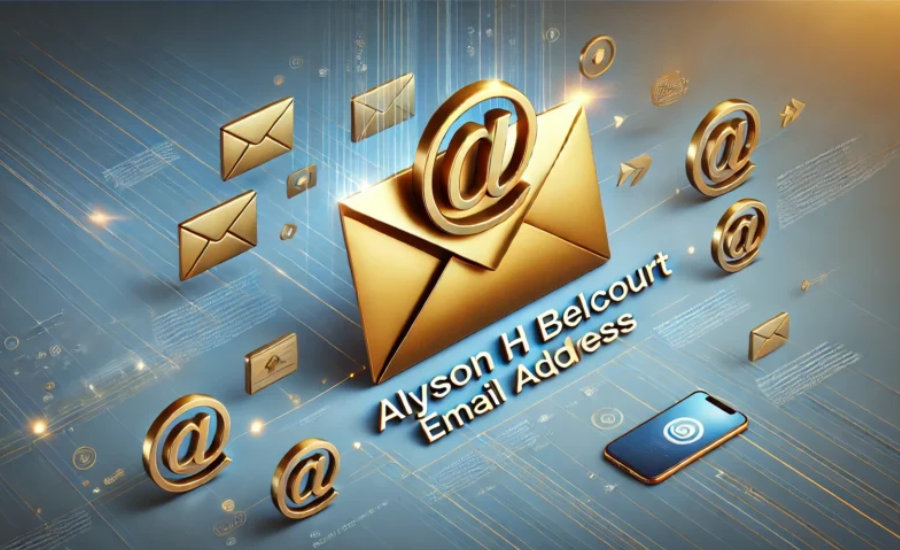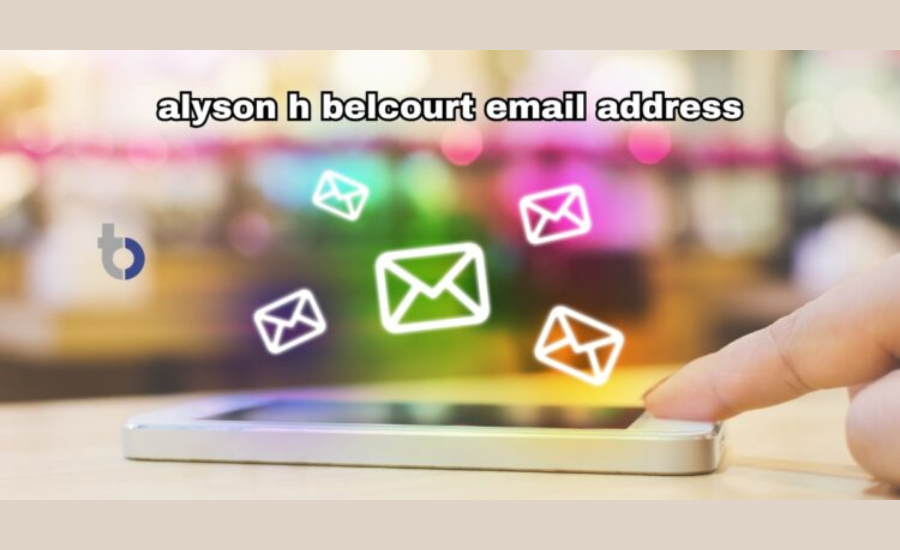In today’s hyper-connected digital landscape, communication has become more accessible than ever. While this accessibility simplifies how we connect with individuals and organizations, it also raises significant concerns about privacy and ethical data use. For instance, seeking contact details—like the hypothetical “Alyson H. Belcourt email address”—raises important questions about ethical information sharing and safeguarding personal data. This article delves into the importance of email, privacy challenges, and strategies for ethical communication in a digital age.
Why Email Remains a Cornerstone of Communication
Email is an integral part of modern communication, serving as a versatile tool that bridges professional, academic, and personal interactions. Its adaptability and reliability have ensured its relevance, even as new forms of communication continue to emerge. Let’s explore its significance in greater depth:
1. A Key Tool for Professional Interaction

Email is the backbone of communication in professional settings, offering unmatched convenience and functionality. It provides a platform for formal and informal exchanges alike, whether it’s for daily updates, team coordination, or high-level corporate discussions.
- Documentation and Record-Keeping: Unlike verbal communication, emails create a documented trail of correspondence, ensuring clarity and accountability. This is particularly important for project management, legal matters, and compliance requirements.
- Accessibility: Emails can be accessed from virtually anywhere, allowing professionals to stay connected while traveling, working remotely, or collaborating across time zones.
- Scalability: From sending individual updates to addressing large audiences through mailing lists, email adapts seamlessly to diverse communication needs.
2. Enabling Academic Progress
In academic circles, email is not just a communication tool—it’s a gateway to knowledge-sharing and collaboration. It connects students, researchers, and educators across institutions and disciplines.
- Collaboration Across Borders: Email allows researchers from different parts of the world to share data, co-author papers, and brainstorm ideas, fostering global academic partnerships.
- Mentorship and Guidance: Professors and mentors often use email to guide students, provide feedback, and discuss academic challenges, making it an essential medium for student-teacher interaction.
- Resource Sharing: Through email, academic institutions disseminate critical information such as course materials, research papers, and event updates, ensuring efficient knowledge distribution.
3. Maintaining Personal Relationships
Email also serves as a valuable tool for nurturing personal connections, particularly when physical distance is a barrier.
- Sharing Milestones: Whether it’s announcing a new job, sharing travel updates, or celebrating a personal achievement, email allows individuals to connect meaningfully.
- Event Coordination: Email is frequently used to send invitations, plan events, and coordinate with multiple participants, ensuring effective communication.
- Long-Term Connections: Unlike social media platforms that may change over time, email provides a stable and enduring means of staying in touch with friends and family.
Privacy in the Digital Era: Challenges and Ethical Considerations
While email provides convenience, it also comes with significant privacy concerns. The improper handling of email addresses can lead to misuse, making it essential to address these challenges responsibly.
1. What Is Digital Privacy?
Digital privacy refers to the individual’s ability to control their personal information online. In the context of email, this means:
- Restricting Access: Ensuring only authorized individuals or organizations can contact you.
- Preventing Misuse: Protecting email addresses from being sold or shared without consent, which can lead to spam and unwanted communication.
- Guarding Sensitive Data: Emails often contain personal or professional information, making secure handling critical to prevent unauthorized access or data breaches.
2. The Dangers of Oversharing
Oversharing email addresses online—whether in public forums, social media, or unsecured websites—can have serious consequences:
- Spam and Unwanted Communication: Publicly visible email addresses are often targeted by spammers, leading to cluttered inboxes and wasted time.
- Phishing Attacks: Cybercriminals may use email to trick individuals into sharing sensitive information, such as passwords or financial details.
- Identity Theft: Email addresses, when combined with other personal data, can be used to impersonate individuals or commit fraud.
Understanding Interest in “Alyson H. Belcourt’s Email Address”

The curiosity surrounding specific contact details, like “Alyson H. Belcourt’s email address,” often stems from legitimate needs but must be approached ethically.
1. Professional Networking
In professional settings, individuals may seek contact information for collaboration, mentorship, or business inquiries. However, the following considerations are crucial:
- Appropriate Channels: Use established platforms, such as LinkedIn, to initiate contact professionally.
- Respectful Communication: Ensure that your outreach is clear, concise, and respectful of the recipient’s time and privacy.
2. Academic or Research Needs
Students and researchers often require expert input for projects or studies. In these cases:
- Seek Consent: Always obtain permission before sharing or using someone’s contact information for academic purposes.
- Provide Context: Clearly explain your intentions, the scope of your research, and how the individual’s expertise can contribute.
3. Personal Reconnections
Reaching out for personal reasons, such as reconnecting with a friend, requires special sensitivity:
- Verify Intentions: Ensure your outreach is genuine and respectful.
- Respect Boundaries: If the person does not respond, accept their decision and avoid further attempts to contact them.
Ethical Guidelines for Seeking Contact Information

When trying to connect with someone like Alyson H. Belcourt, it’s essential to follow these ethical steps:
1. Use Professional Platforms
Leverage networking platforms like LinkedIn, which allow professionals to connect without infringing on privacy. These platforms often include messaging systems designed for initial outreach.
2. Check Official Websites
Many professionals list their contact details on company or organizational websites. Always use official channels for communication when available.
3. Attend Networking Events
Industry conferences, workshops, and seminars provide an excellent opportunity to meet professionals and exchange contact details naturally. This fosters genuine connections and builds trust.
4. Respect Privacy
If attempts to connect are unsuccessful, accept the outcome. Persistent or invasive efforts can harm reputations and are often counterproductive.
Legal Protections for Email Privacy
Laws such as the General Data Protection Regulation (GDPR) in Europe and the California Consumer Privacy Act (CCPA) in the U.S. emphasize the importance of email privacy.
- Individual Rights: These regulations empower individuals to control their data, including email addresses, and require organizations to handle this data responsibly.
- Consequences for Violations: Unauthorized sharing of email addresses can result in significant fines and reputational damage.
- Promoting Ethical Practices: By adhering to these laws, individuals and organizations can foster a culture of trust and transparency in digital communication.
Conclusion
Email remains a vital communication tool for professional, academic, and personal interactions, offering unmatched versatility and reliability. However, its widespread use underscores the need for ethical practices and robust privacy protection. Safeguarding personal email addresses and adhering to digital privacy laws, such as GDPR and CCPA, help mitigate risks like spam, phishing, and unauthorized access. Ethical approaches, including using professional platforms, respecting boundaries, and leveraging official channels, ensure responsible communication. By balancing accessibility with privacy, email fosters trust, transparency, and meaningful connections in our digital world.
FAQs
Q: Why is email still important in the age of social media and instant messaging?
A: Email offers unique advantages, such as formal communication, detailed documentation, and scalability for both professional and personal interactions. Unlike many social platforms, it provides a stable, universal platform that isn’t tied to specific apps or networks.
Q: What are the biggest risks of sharing my email address online?
A: Sharing your email address publicly can lead to spam, phishing attacks, identity theft, and other cyber threats. It’s essential to limit exposure and share your email only with trusted sources.
Q: Is it illegal to share someone’s email address without their consent?
A: In many regions, privacy laws like the GDPR and CCPA regulate how personal information, including email addresses, is shared and used. Sharing an email address without consent can result in legal consequences, depending on the jurisdiction.
Q: What are the ethical ways to contact someone for professional or academic reasons?
A: Use professional platforms like LinkedIn or official organizational websites. Always provide clear context for your outreach and respect the recipient’s privacy and time.
Q: What should I do if I receive unwanted emails after sharing my address?
A: Mark unwanted emails as spam, unsubscribe from mailing lists, and report persistent offenders to your email service provider. For severe cases, consider legal action under applicable data protection laws.
Read Next: why-smm-panel-is-best-for-fashion-marketing-engagement-strategies
